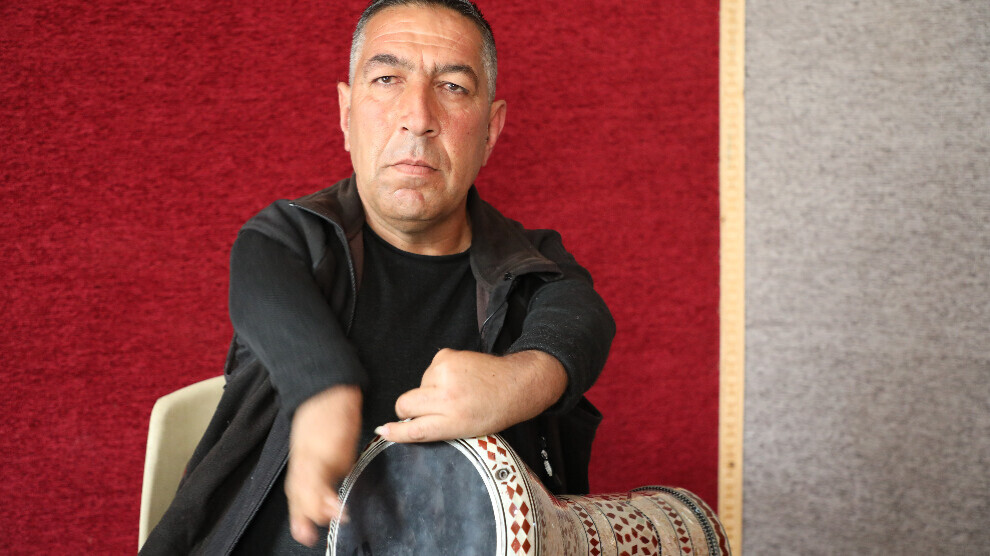A darbuka to overcome all obstacles
Mahmut İsmail Bekir, who is disabled from birth, clings to life tightly thanks to his companion, the darbuka.
Mahmut İsmail Bekir, who is disabled from birth, clings to life tightly thanks to his companion, the darbuka.

Mahmut İsmail Bekir, who started playing the darbuka at the age of 6, says that the children ran away from him because of his disability and that he drew his friends to him by playing the darbuka.
Mahmut İsmail Bekir, born in Qamishlo in 1976, has been disabled since birth. Mahmut, who has both hands crippled, starts playing the darbuka at the age of 6.
Mahmut explained how he met the darbuka: “It was an interest that started at a young age. It caught my attention. One day, we went to Aleppo with my mother and father. I saw a darbuka in the bazaar and embraced it. I said I wanted to buy it. I was already interested. When I came across it, I did not want to leave it. From that moment on, there was an unbreakable bond with the darbuka. Because I was the youngest child in the house and my hands were crippled, my family always treated me in a special and emotional way. Now the darbuka was not just an interest for me, it belonged to me. I had a darbuka.”
Mother and father support
Standing on his feet with the advice of his parents, Mahmut stated that his mother always said to him to not see himself as incomplete.
Mahmut said: "During my school years, children were afraid of me and ran away. Inevitably, the children were afraid of my hands. As a child, I couldn't understand much. Of course I was upset, everyone had friends. I didn't.”
A darbuka to make friends
Stating that one day he took his darbuka and went to school and started playing there, Mahmut said that the children gathered around him. He expressed his joy in those days as follows: “I reached all the children through the darbuka and gathered the children around me. Through the Darbuka, they both overcame their fears and approached me. This is how I built my circle of friends. I still have friends from those processes, I have sincere friendships.”
Mahmut said that “people sometimes choose what they have difficulty with. I did the same. Both my arms are very short and I don't have fingers. The darbuka is a hand-played musical instrument and my hands are crippled. Darbuka is now my hand, a part of my body. Even if I reach 100 years old, the darbuka will remain my closest companion, only death will separate me from the darbuka. He is with me wherever I go and is the closest friend to me in my life.”
Mahmut said that he is able to meet his individual needs and adds: “I can do all the work that a person without a disability can do. I can even write. When there is a job that I cannot do, I do not know any obstacles. I may get upset, but in the end I say I'll do it, and that's how it is. I had risked many things, overcome that fear, hesitancy, and insecurity. Sometimes I look at people with their hands and I look at myself. I think I can do better. Even though my hands are crippled, I think I can play the darbuka masterfully.”
Member of Koma Botan
Reminding that he joined Koma Botan in 1996, Mahmut added: “To protect culture is to protect society. Taking part in culture and art makes me happy and adds colour to my life. I started playing the darbuka in Koma Botan in 1996 and took a break for a while. I have been in Koma Botan again for 5 years. I have an inseparable connection with art.”